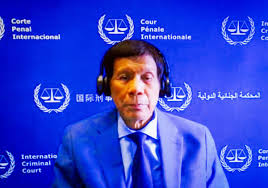The hard power memory of Rodrigo Duterte’s extrajudicial (EJK) killings as they centered around his bloody drug purges has come back to haunt him. Finally incarcerated in an ICC containment facility in the Netherlands, the near-octogenarian Duterte will have an abundance of time to consider his life and his actions, and indeed his by now befouled and gruesome legacy.
With this as a backdrop, the Filipino people can turn to William Shakespeare. As anyone who is familiar with his plays will know, the English playwright wrote several of them which featured aggrieved ghosts tormenting their murderers.
One can make a similar allusion to the “ghosts” of the EJK victims. The focal point in the whole matter of Duterte’s arrest is the administration of justice. We are talking about the Philippines, a country where the application of justice has been known to be thrown completely under the bus.
The metaphysical afterthought of the victims makes its way into the real-world atrocities of the draconian Duterte dystopia. Justice is being served for the souls of the dead and the living. Kindred spirits of a sort with the EJK subjects, Shakespeare’s phantoms have complementary roles in the rather abrupt delivery of justice to the former president.
In Act 1, Scene 5 of “Hamlet,” the father’s ghost implores his son to “Revenge his foul and most unnatural murder.” Hamlet, now conscious of the existential wrong done to his father, readily assumes the role of avenging angel so that his father’s soul can rest in peace:
“Haste me to know ’t, that I, with wings as swift
As meditation or the thoughts of love,
May sweep to my revenge.”
In the context of Rodrigo Duterte’s arrest, the spectres of his drug war casualties passionately cry out for revenge and/or justice. Like Prince Hamlet, their loved ones are all too anxious and determined to gratify them so that they can once and for all embark on the path to eternity.
It is not so far-fetched that Duterte’s being brought to justice in 2025 should find some morally-intertextual relationship with the Bard who wrote his masterpieces more than 400 years ago halfway across the world. If after all, there’s any validity to the notion of a Collective Unconscious that is shared by all humankind, then it is not beyond reason to find a tie between contemporary Philippine developments and the determinative power of Shakespeare’s literature.
Another otherworldly-inflected narrative spanning the Duterte and Elizabethan historical timeframes is “Richard III” published in 1595. Apprehending the heart of a tragic collection of fatalities at the hands of a ruthless, conniving, and bloodthirsty ruler, the Machiavellian, serial killer theme of “Richard III” is eerily reminiscent of Rodrigo Duterte’s war crimes.
People excel at what they do and Shakespeare’s Richard III was certainly a villainous case in point. In the Bard’s treatment, there seemed to be no cure or limit to the sovereign’s pathology for resorting to the most extreme way of dealing with an opponent, real or perceived. Plainly, Shakespeare reproduced Richard III from the historical one as an alignment of dark, infinite ambition, head-on-a-platter agency, and black-draped political methodology. Echoes of Duterte abound.
The ghost of Richard’s spouse Anne, a pitiful target of manipulation by the Hunchback King, is drawn by Shakespeare as
“wretched Anne thy wife,
That never slept a quiet hour with thee,
Now fills thy sleep with perturbations."
Towards the end of the play, Richard’s dead pass by him in his nightmares, having in mind that he “despair and die” for what he has done. I have no earthly idea if Rodrigo Duterte has experienced any such apparitions in his subconscious state, but his sadistic willingness to maximize greater suffering for political ends shares some common currency with Richard III.
Very much so like Duterte, Richard III dubiously necessitates his wicked actions which compound the ghosts’ bitterness, both Richard’s and hypothetically Duterte’s. The two misanthropic leaders sent forth the rationale of protecting national security to their respective countries, countries brimming with fear and doubt. The cynical, exploitative proposition of order-over-virtue is something Duterte and Richard III have in common with other dictators.
In Don Delillo’s 1997 novel “Underworld,” there is the line “the dead fall upon the living.” Meaning to say, the dead never let the living forget them or what fate has befallen them. When employed thusly, Delillo’s words can capture the imagination of all sides in the EJK killings.
And then, as if to speak for the surviving EJK families and their deceased relatives, Delillo hits the living “sinners” with the grisly news that “The dead have come to empty out the wine gourds, to serve a skull on a platter to gentlefolk at their meal.”
Delillo also mentions the “gluttony, lust and greed” that in his terms refers to postwar American society but that can also be accurately wrapped around the cruel regime of Rodrigo Duterte.
ALLEN GABORRO

Comments
Post a Comment